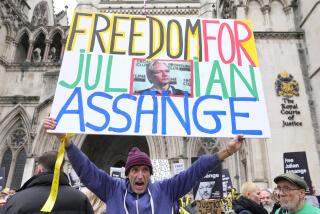British computer geek’s case highlights extradition issue
BOLSOVER, ENGLAND — One of America’s most wanted men, here in Britain anyway, is a slightly awkward computer geek who still drops by his mom’s house on weekends to enjoy a home-cooked meal, the kind he doesn’t get sharing an apartment with other college students.
But Richard O’Dwyer will be eating prison grub soon if authorities in Washington have their way. O’Dwyer, 24, is due to be shipped across the Atlantic to face criminal charges in a country he’s never set foot in. His offense: creating a website that featured links to pirated movies and TV shows.
To many in the U.S., extraditing O’Dwyer and others like him represents justice being served. But to others, mostly here in Britain, it’s a sign of an Anglo American extradition agreement that’s grossly weighted in favor of the U.S., becoming an increasing source of resentment for the lesser power in the “special relationship.”
The issue has garnered particular attention lately because of the case of Julian Assange, the founder of the whistle-blowing website WikiLeaks. Assange, who is Australian, is now holed up in the Ecuadorean Embassy in London in a bid to avoid extradition to Sweden on allegations of sexual assault, which he and his supporters insist is a pretext for eventually sending him on to the U.S. to face accusations of espionage.
Critics here say too many Britons are being bundled off too easily to face trial in the United States, sometimes for seemingly minor offenses, while far fewer suspects are sent in the opposite direction. A treaty originally touted as speeding up the extradition of accused terrorists and mobsters is now being applied to computer hackers and lesser offenders.
“The net has been far wider than was envisaged at the time,” said Dominic Raab, a member of Parliament from the ruling Conservative Party. “This is not an excuse to bash the Americans. This is a campaign to protect British nationals.”
Since the treaty was signed in 2003, 73 people of various nationalities have been packed off to the U.S. from British shores to face charges, versus 38 in the opposition direction, according to the American Embassy.
But Raab said a look at the nationalities of those shipped to America is more telling.
“For every one U.S. national extradited to Britain, seven Brits are surrendered to the U.S.,” he said. “So with respect to our own citizens, the arrangements have proved lopsided in practice.”
Activists here have seized on a number of high-profile, controversial cases to push for tightening Britain’s extradition arrangements with the U.S., including those of O’Dwyer and Gary McKinnon, a 46-year-old with Asperger’s syndrome who admits to hacking into Pentagon databases but insists he did so in search of evidence of UFOs.
In March, a parliamentary committee urged Prime Minister David Cameron to “act immediately to deal with growing public unease” over the extradition treaty, which the panel’s chairman said made it “easier to extradite a British citizen to the U.S.A. than vice versa.”
For its part, the U.S. bristles at perceptions here that it is an arrogant, prosecution-happy country eager to mete out lock-’em-up justice to Americans and non-Americans alike, and it says the agreement is fine as is.
“It promotes the interests of justice in both our countries,” Louis B. Susman, the U.S. ambassador to London, said in a rare appearance before members of Parliament.
He noted that a blue-ribbon panel appointed by the British government gave a clean bill of health to the extradition treaty last year, and cautioned critics not to view the issue “through the prism of individual cases where sentiment and emotion can cloud reality.”
Here in Bolsover, outside the city of Sheffield, Julia O’Dwyer is battling an extradition order for son Richard, the university student who set up a website with links to pirated Hollywood films and television programs.
She described him as a shy young man who, while sitting at her kitchen counter two years ago, opened his computer to discover that U.S. authorities had taken down his site, TVShack.net, and replaced it with a big-lettered warning about copyright infringement.
“I can just vaguely remember him muttering away: ‘I can sort that out. What does America have to do with me?’ ” said O’Dwyer, adding that she had no idea at the time what the website was or did.
Her son resurrected the site under a different address, but that, too, got taken down. O’Dwyer acknowledges that her son made a tidy sum of money from allowing ads on the website but that, ironically, he frittered some of it away by going out to the movies, even as his site steered users to unlicensed online content.
British and American officers knocked on Richard O’Dwyer’s door in November 2010, took him in for questioning, confiscated his computer and told him to show up for a bail hearing in six months down in London. There, he was informed that he would not face trial in Britain but would be extradited to the U.S. instead.
The O’Dwyers are awaiting an appeal hearing against the extradition order this fall, which is probably a long shot. Julia O’Dwyer says her son, who prefers not to speak to the media, is still planning his future as normal, including graduating from college next spring with a degree in interactive media and animation. But if he is sent to the U.S. and convicted of copyright infringement, he could be facing a prison sentence of anywhere from two to 10 years.
His mother blames the Conservative-led coalition government for failing to fulfill its preelection promise to tighten extradition requirements.
“America is only doing it because they can,” she said. “No American’s been extradited to [Britain] for something they’ve done on American soil.... But America is allowed by our government to seek extradition of our people who have never set foot in America.”
David Bentley, an expert on extradition at the Chatham House think tank in London, said that isn’t necessarily unreasonable. A crime doesn’t have to be committed in the U.S. for American interests or victims to suffer from it -- for example, in the case of computer hacking.
“I do not believe American prosecutors are chasing these people simply to put ticks in boxes and putting gold stars on their records,” Bentley said. “These are real cases, and there’s real damage being done, and the harm is at the U.S. end.”
Members of Parliament are waiting for the British government to respond to their suggestions for change, such as having judges here decide in open court whether someone should be extradited rather than leaving it to U.S. and British prosecutors to hash out behind closed doors.
Raab, the member of Parliament, considers such recommendations reasonable and simple, and brushes aside objections from the U.S. Embassy that no changes are merited.
“I’ve heard very few people, if anyone, say we didn’t need reform,” Raab said. “Every time I meet officials from the embassy I always say: ‘Haven’t you got better things to be doing?... Resolving this problem is in your interest. Let’s remove a diplomatic thorn in the side.’ ”
--
More to Read
Sign up for Essential California
The most important California stories and recommendations in your inbox every morning.
You may occasionally receive promotional content from the Los Angeles Times.











